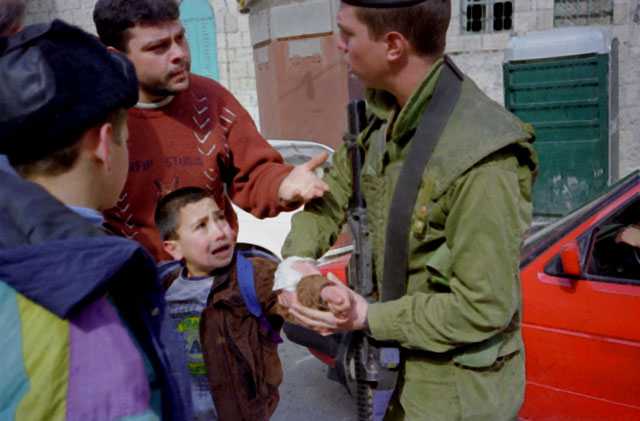With a timid smile, 16 year-old N twiddles his thumbs as he tells me his frightening story. Israeli soldiers came to his house a year ago at dawn. He was blindfolded, handcuffed, and taken away without any explanation.
When the military jeep finally stopped, the soldiers took him to a room with chairs. They began cursing at him and using derogatory terms against his mother and female siblings. The soldiers then put sunglasses on N's eyes and a female headband on his head.
"They took pictures of me; they were laughing," he told me.
"Aren’t you going to confess?" the soldiers kept asking him… "To what?" he would reply. "To throwing stones," they would say.
Afraid of ending up in jail, N refused to confess to the alleged offence.
"I kept telling them: I didn't do it. I didn't do anything," he recalled.
Until this point, N's story sounded familiar to someone like me, who's been covering the conflict in Palestine for years. Beatings, humiliation, and mistreatment of Palestinian detainees, including minors, are regularly documented by human rights organisations.
But N's story was just beginning.
"There was a dog barking outside the room… The soldier told me he would bring it in to f**k me if I didn't confess… I was so scared… The guy then took out a stick; he whipped it forward and it got longer. He told his friends, who were looking on and laughing at me: "This boy doesn't want to talk. Let's pull down his pants so I can shove this stick up his a**."
"I tried to hold on to the chair; he kept poking me, groping my privates with the stick, trying to get me off the chair," N said while avoiding eye contact with me.
The Palestine Chapter of Defence for Children International (DCI) has collected 100 sworn affidavits this year of Palestinian children, under the age of 18, who said they were mistreated by their Israeli interrogators. Fourteen of them say they were either sexually abused or threatened with sexual assault, including rape, if they didn't confess to what their interrogators accused them of.
N is one of these children… His confession landed him a three month sentence in an Israeli jail.
Because of the stigma attached, there are fears that many more children may have suffered similar abuse but have been afraid to come forward.
N kept telling me he felt awkward talking about his experience. "It feels bad to talk about this. I mean, what a thing to talk about… It's shameful," he told me.
So I asked this shy teenager why he mustered the courage to speak out. "I want justice," he said. "I wish these people could be tried in a court so that they don't do this to other guys."
N told me that at prison, he met many boys who had suffered similar abuse.
Israeli forces arrest approximately 700 Palestinian minors every year. During interrogation, these minors are not allowed to have contact with their lawyers or families. Human rights organisations say the alleged abuses happen during this period of isolation.

"These practices are meant to break the children. In a way, when you break the spirit of these children, you're breaking the spirit of the nation," Rifaat Kassis, the director general of DCI, told me.
And it's because of the powerful impact sexual abuse has on these children that DCI has sounded the alarm at the highest possible international levels. The organisation has communicated affidavits to the Special UN Rapporteur on Torture, hoping to galvanise enough international pressure to bring these abuses to an end.

This step is a reflection of the stonewalling human rights organisations usually face from Israeli authorities.
"Most of the time, the Israelis, they just dismiss our allegations and say this is not correct, this is not true; so if this is the case, we challenge them to record these interrogations and let the interrogations happen with the lawyer," Kassis told me.
This time was no different. We tried to request a response from the Israeli army but all our requests were turned down. The army told us they would only comment if they had more specific details about these cases, which is a demand the children's lawyers say could jeopardise their clients.
But after the report aired on Al Jazeera, the Israeli military issued a statement rejecting the allegations and the DCI report. The army also said its practices were consistent with international law; a claim hotly contested by all human rights organisations working in Israel and the Occupied West Bank.
The Israeli army's response to these allegations also proves what DCI admits: this is a long-term battle.
So is recovery - N still struggles with his experience
"I'll never forget his eyes; the way he looked at me," he said, referring to his interrogator.
N still has nightmares and struggles to curb the fear he feels when the army is on patrol nearby.
But he's relatively lucky, having a supportive family that has encouraged him to talk about his experience. And N has received counselling from the torture victims' centre of the YMCA (Young Men's Christian Association).
Still, this is a frustrating battle, requiring endless patience.
The director general of DCI told me his organisation's petitions and campaigns within the Israeli military system have generally yielded very limited results, if at all. That's why these child rights advocates are hoping that outside pressure will eventually help prevent further instances of abuse and afford children like N the basic rights and protection they should be entitled to.
The tormenting part of this battle, however, is knowing that until success is achieved, there is nothing these activists can do for the children now detained by Israeli soldiers on a regular basis.
They can only hope that counselling, after the fact, can help them recover.
http://blogs.aljazeera.net/middle-east/2010/05/30/children-behind-israeli-bars
![[9_10_s22.jpg]](https://blogger.googleusercontent.com/img/b/R29vZ2xl/AVvXsEjTXnQay9wzz0E6nVHrVhaHKoq_zYXDqZjijHlNDQzj90MZzInrCuVX4ciFYCiBfZ7lhlgr2bBhhnl7ddWbhdih5JbXjQYbA605TNyiq046bQqjG2A4S-nHTmh1VBTQSG6tmc23wq47QQ/s1600/9_10_s22.jpg)




No comments:
Post a Comment